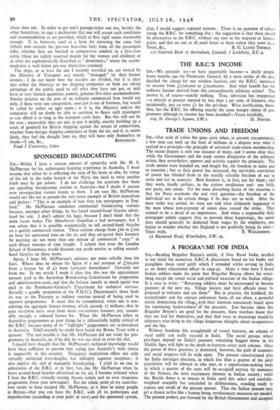TRADE UNIONS AND FREEDOM
SIR,—Our scale of values- has gone awry when, in present circumstances, a few men can hold up the food of millions in a dispute over what it exalted to a principle—the principle of universal trade-union membership. The recent dispute is only one instance of many, and it seems clear that, while the Government and the trade unions disapprove of the arbitrary action, they nevertheless approve and actively support the principle. The trade unions were founded on, and fought for, the freedom to unite and to associate ; but as their yower has increased, the inevitable corm-06°n of power has blinded them to the equally valuable freedom of not to unite and not to associate. Real freedom is, in fact, not for them ; and they work, kindly perhaps, to the sinister totalitarian end : one faith, one party, one union. Yet the most disturbing factor of the situation is that the Press overlooks the real vital question—the freedom of the individual not to do certain things if he does not so wish. After the meat strike was settled, we were not told what ultimately happened to the men whose non-payment of union dues caused the strike. That seemed to be a detail of no importance. And when a responsible daily newspaper calmly suggests that, to prevent these happenings, the union dues should generally be dedUcted from wages by the employers, one begins to wonder whether this England is not gradually losing its soul.—






























 Previous page
Previous page